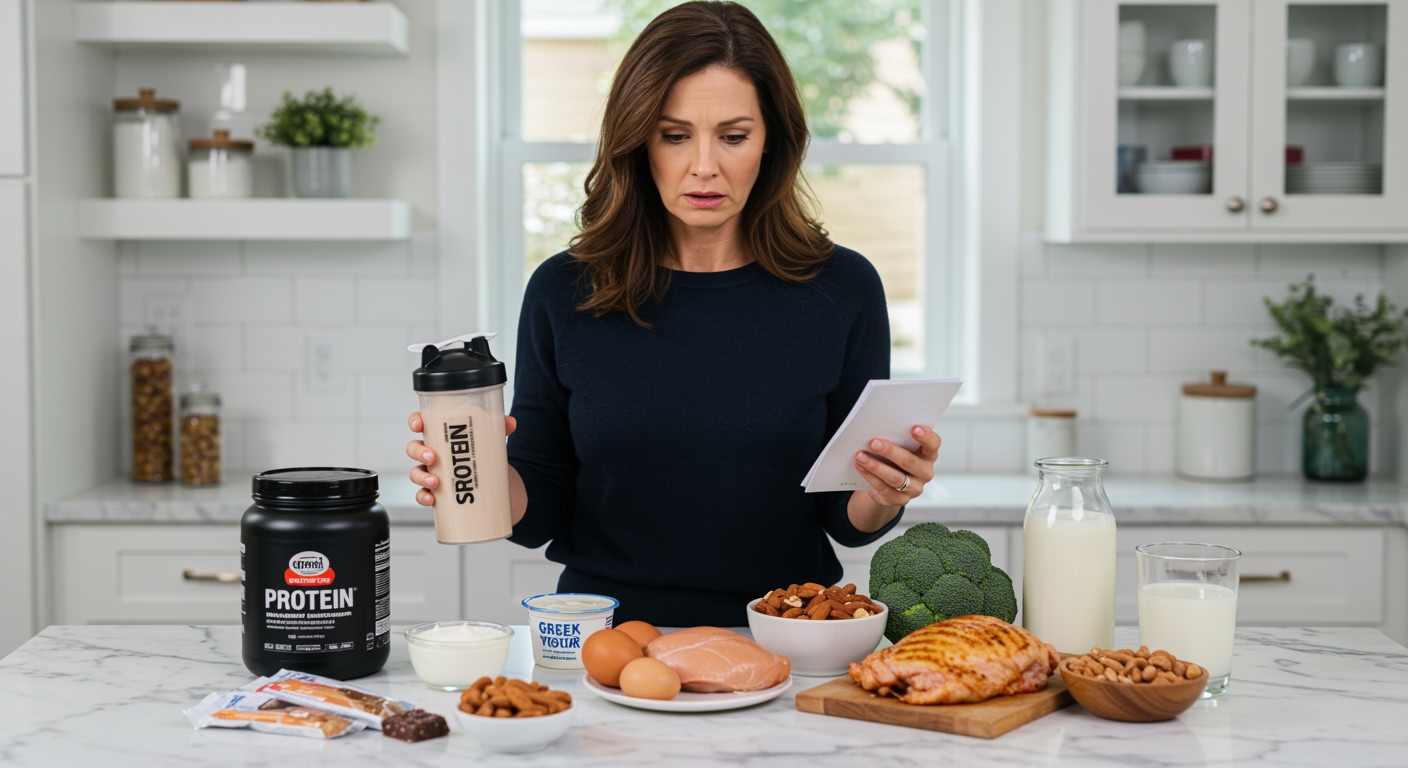✪ Key Highlight: Americans consume 20% more protein than needed while processed protein products flood markets with hidden health risks.
Introduction
Protein products are taking over supermarket shelves faster than you can say muscle building.
The global protein snack market is exploding toward $10 billion by 2032, driven by fitness influencers promising quick results and lean bodies.
Hi, I’m Abdur, your nutrition coach and today I’m going to analyze the dangerous protein craze that’s sweeping America and putting your health at serious risk.
Why Are Protein Products Flooding The Market?
Social media influencers are fueling this protein obsession by sharing endless recipes and product recommendations.
They make the fit lifestyle look effortless while highlighting muscle building and weight loss benefits.
Companies are capitalizing on people’s busy schedules by pushing convenient protein solutions.
These products promise quick results without the hassle of meal planning or cooking.
The marketing creates a false need by suggesting that regular food cannot provide adequate protein intake.
People are loading their carts with protein shakes, bars, cookies, and even protein water.
✪ Fact: The protein snack market growth rate exceeds most other food categories due to aggressive marketing tactics.
What Hidden Dangers Lurk In Processed Protein Products?
Dr. Anfossi warns that many protein products contain unclear ingredients that compromise nutritional value.
A protein pudding provides 20 grams of protein but often includes artificial sweeteners, preservatives, and stabilizers.
These ultra-processed foods undergo extensive manufacturing that strips away natural nutrients.
Greek yogurt with almonds and oats delivers the same protein content with superior nutritional quality.
Processed protein products often contain hidden sugars, artificial flavors, and chemical additives.
Long-term consumption of these additives may contribute to chronic health problems that develop gradually over time.
✪ Pro Tip: Always check ingredient lists and choose products with five or fewer recognizable ingredients.
Are Americans Actually Eating Too Much Protein?
Harvard professor Walter Willett confirms that most Americans already consume 20% more protein than recommended daily amounts.
This excess protein often comes from animal sources high in saturated fat and cholesterol.
Studies show no clear link between eating more protein and living longer lives.
Research reveals that animal protein consumption correlates with higher death rates compared to plant proteins.
Plant proteins from beans, lentils, nuts, and seeds contain beneficial fiber and unsaturated fats.
Eating excessive protein can crowd out important foods like fruits and vegetables from your daily diet.
The recommended protein intake for adults is 0.8 grams per kilogram of body weight daily.
✪ Note: A 150-pound person needs only about 55 grams of protein daily for optimal health.
What Serious Health Risks Come With Protein Extremes?
Extreme high-protein diets like the carnivore diet eliminate entire food groups and create nutritional imbalances.
These diets can cause high cholesterol, fiber deficiency, and missing essential plant nutrients.
Experts warn that extreme protein diets may increase risks of cancer, heart disease, diabetes, and Alzheimer’s.
Excessive protein intake, especially from animal sources, puts unnecessary strain on kidneys.
High protein consumption can lead to dehydration as kidneys work harder to process nitrogen waste.
People with existing kidney disease face serious complications from excessive protein consumption.
Weight gain occurs when protein calories exceed your daily energy expenditure needs.
✪ Pro Tip: Consult your doctor before dramatically increasing protein intake, especially if you have chronic health conditions.
How Can You Choose Healthy Protein Sources?
The Mayo Clinic recommends choosing nutrient-rich protein sources over processed alternatives.
Soy, beans, nuts, seeds, fish, lean chicken, low-fat dairy, and egg whites provide superior nutrition.
Avoid processed meats that contain nitrates, excess sodium, and harmful preservatives.
Nicole Papantoniou warns that too much protein can lead to kidney strain, weight gain, and dehydration.
Balance your protein intake with fiber-rich foods, healthy fats, and essential vitamins.
Whole foods provide complete nutrition packages that isolated protein products cannot match.
Focus on variety and balance rather than chasing single nutrient maximization.
✪ Fact: Whole foods provide synergistic nutrients that work better together than isolated protein supplements.
The Bottom Line
The protein craze represents another wellness fad that creates unnecessary needs while potentially harming your health.
Real nutrition comes from balanced eating with whole foods, not from chasing the latest trendy nutrient.
Share your thoughts about the protein trend in the comments below and let me know if you have questions about creating a balanced nutrition plan.
References
At NutritionCrown, we use quality and credible sources to ensure our content is accurate and trustworthy. Below are the sources referenced in creating this article:
- Harvard T.H. Chan School of Public Health: Protein is important, but we’re eating too much, experts say
- Mayo Clinic: High-protein diets: Are they safe?
- Florida State University: The protein craze: Florida State University expert explains the why behind a high-protein diet
- American Heart Association: Protein and Heart Health
- Good Housekeeping: Nutrition Trends 2025





